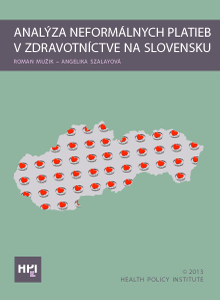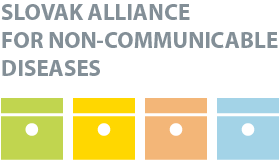—
HPI Network > HPI - Health Policy Institute > Analyses > Analysis of informal payments in the health sector in Slovakia
Analysis of informal payments in the health sector in Slovakia
Tuesday, 28. January 2014, 15:36 — Angelika Szalayová and Roman Mužik
Analysis of informal payments in the health sector in Slovakia examines the results of an online survey (1,200 respondents). The aim of the study is to identify specific indicators for the occurrence, symptoms and causes of informal payments in the health sector. Under the results we are proposing the measures that will contribute to a more transparent healthcare.
 The goal of this study was to identify on the basis of survey the specific indicators of occurrence, exhibition and causes of informal payments in health care based on which will be possible to propose measurements, which will contribute to a more transparent health sector. The survey was unique in the fact that it concentrates on experience and did not rely on an opinion or emotional, subjective perception of people. Moreover, the survey was unique in its methodology which comprised of the collection of data by means of online Internet tools.
The goal of this study was to identify on the basis of survey the specific indicators of occurrence, exhibition and causes of informal payments in health care based on which will be possible to propose measurements, which will contribute to a more transparent health sector. The survey was unique in the fact that it concentrates on experience and did not rely on an opinion or emotional, subjective perception of people. Moreover, the survey was unique in its methodology which comprised of the collection of data by means of online Internet tools.
The research involved approximately 1,200 respondents. The demographic profile (the ratio of men to women, age structure, education and region) does not correspond to the demographic structure of the population of the Slovak Republic (SR), hence the outcomes of this survey cannot be deemed from the statistical perspective as representative. However, they have an unquestionable qualitative informational value.
According to the survey as much as 71.4% of respondents (843 out of 1,181 respondents) gave an informal payment in any form, where as much as 18.5% (approximately each fifth respondent) encountered a demand corruption. Under the term demand corruption we include any type of payment which was not given by the patient arbitrarily or with the aim of bribing somebody but such a payment was (in)directly demanded by the physician.
On the contrary, as for 23.5% of respondents the payment was not regarded as an informal payment with the nature of corrupt behavior yet only a so called gratitude payment. Under the term gratitude payment (or tips) we describe in this survey all the payments where the respondents stated that they gave the payment arbitrarily and at the same time they stated that they wanted to express gratitude or it is a matter of decorum and it is a part of the system, a habit. All together 47.9% of respondents encountered some form of corruption – either demanded or arbitrary. As an arbitrary corruption we describe any type of informal payment which the respondent gave arbitrarily (i.e. it was not demanded from his/her)and is not considered a gratitude payment.
Respondents mentioned 1,514 contacts with health care professionals when they handed in any type of informal payment to the physician. In total, the most of informal payments gave the respondents to the general practitioner for adults or children (28%). They are followed by surgeons (25%), gynecologists (24%), internists (18%), orthopedists (9%) and neurologists (8%).
The gratitude payments were given by respondents to general practitioners (8.1% of respondents), gynecologists (7.9%) and surgeons (6.7%). A bribe was asked from respondents mainly by surgeons (1.9%), gynecologists (1.9%) and internists (1.3%). Arbitrary bribes gave respondents mostly to general practitioners (13%), surgeons (9.7%), gynecologists (8.5%) and internists (8%).
The most frequent type of informal payment was a box of chocolates or other candy which was handed in by 52% respondents. They were followed by alcohol with 38%, flowers with 14% and cash payment in the range from 101 to 333 euros with 13%. If the informal payment was requested by physician then it was mainly a cash payment (they composed 54.9% of requested informal payments), mostly in the range from 101 to 333 euros (they composed 20.9% of requested in formal payments and were encountered by 6.9% of respondents).
Respondents mention as the most frequent reason an expression of gratitude (31.4%). Furthermore respondents were giving informal payments in order to get a better treatment (26.8%), to get the services as soon as possible so they do not have to wait (15.3%), in order to get to a highly qualified specialist (15.2%) or as a matter of principle that it is a custom and a matter of decorum (11.4%). Out of other reasons which were stated in more than 5% of cases was displayed a worry that the respondent can get at least some treatment or they wanted to hospitalize a relative or they needed a sick leave.
The reason why physicians ask for bribes is that they can provide the patient with a better health care (1.9%). This reason substantially dominates also when patients hand in the informal payments (17.5%). Patients give informal payments mainly in order to get the services as soon as possible so they do not have to waitand in order to get to a highly qualified specialist. We can already label giving of informal payments because of this reason as a certain form of corrupt behavior.
The most spread type of expressing gratitude is chocolate boxes or other candies (52%), then alcohol (21%) and flowers (11%). As for surgeons, gynecologists and orthopedists the gratitude payments and cash payments accounted for up to 333 euros (approximately 10 000 SKK).
The physicians mostly demanded an informal payment from the patients so that they can provide the patient with a better treatment (28%), in order to get a highly qualified specialist (16%) and in order to get at least some treatment (14%).
Out of required payments dominates the cash payment ranging from 101 to 333 euros (34%), cash payment higher than 334 euros (12%) and cash payment up to 33 euros (10%). As for the general practitioners the bribes are in kind (75%) and cash payment up to 33 euros (25%). Conversely, as for the orthopedists, all the bribes are in the form of cash payments, where 25% was a cash payment higher than 334 euros. Financial cash payment is in 79% in the form of a bribe also with surgeons and 71% with gynecologists.
77% of the respondents think they got in return for their informal payment what they required or what was offered to them out of the respondents who acknowledged that they gave at least one informal payment. This fact implies that informal payments guarantee to both sides the services which are often not provided in demanded quantity, quality and time by the system. On the other hand, for 17% of respondents an informal payment did not fulfil their expectations. Respondents were more satisfied with services in case when they handed in the informal arbitrarily than in case when it was demanded.
On the basis of these findings we proposed measurements which could contribute towards decreasing the presence of informal payments in health care:
- Defining a legal right – entitlement
-
Transparency and providing of information
- Availability of information about health personnel
- Availability of information about waiting, public waiting lists
- Availability of information about using health care
- Availability of information about payments, fees and quality
- Possibility of official payments and financial co-payments
- Protection and motivation of the whistleblowers
- Increase the quality and efficiency of jurisdiction and renew the trust into this institution
- Improve the availability and quality in health careand orientate it towards consumers
- Raising public awareness of consumers
The study in Slovak language can be download for free here.
News
The amendment of the Decree on emergency medical service
Health insurance companies returned over 400 thousand €
The HCSA received 1,647 complaints last year
A half million people will earn more
Most of public limited companies ended in the black
Debt of hospitals on premiums has grown to nearly € 105 MM
Slovak health care may miss € 250 million next year
Profits of HIC amounted to € 69 mil. last year
Owners of Dôvera paid out money but did not paid taxes
Like us on Facebook!
Our analyses
- 10 Years of Health Care Reform
- New University Hospital in Bratislava
- Understanding informal patient payments in Kosovo’s healthcare system
- Analysis of waiting times 2013
- Health Policy Basic Frameworks 2014-2016
- Analysis of informal payments in the health sector in Slovakia
- Serbia: Brief health system review
developed by enscope, s.r.o.
